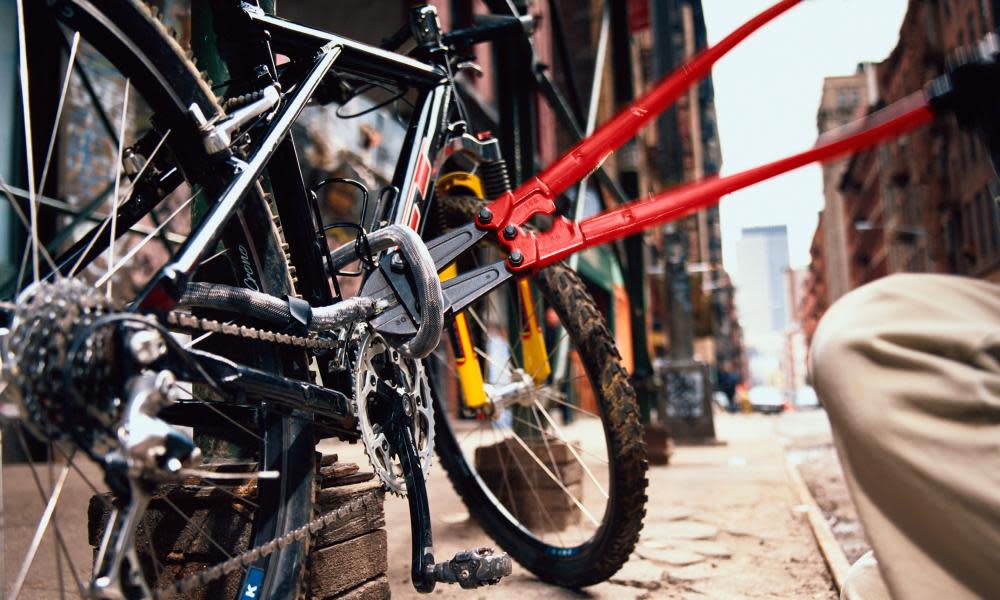Bike theft affects the young and poor most – why is it not taken seriously?

For many people a bicycle is the only transport they can afford and the only exercise they get. These people are often among society’s most vulnerable, and the impact of the loss of their bike can be devastating. So why is cycle theft so often seen as a minor crime?
According to the police, 96,210 bikes were stolen in 2018, and about one in 50 bicycle-owning households are victims of cycle theft each year, but it’s a crime disproportionately visited on the young and the poor.
According to the ONS, victims are most likely to be aged 16-35, earn less than £10,000 per year, and to live in urban areas, particularly places of “high incivility” and in flats or maisonettes.
The police have a way to go to tackle the issue. According to a survey for Bike Register, 50% of victims felt police didn’t investigate the crime, while those engaged in cycle theft see it as low risk in terms of being caught. Police recover just 3% of stolen bikes.
The problem is almost certainly much greater, as UCL research found that the police were typically only informed of one in every five cycle thefts. People often don’t report it thinking there’s nothing the police can do, so the full scale of the problem remains hidden.
The national police lead on cycle theft, Supt Mark Cleland, says he and his colleagues are about to launch a national cycle crime strategy after identifying cycle theft hotspots and priorities across England and Wales. The London-based cycle crime unit is being disbanded, and training will be given to 23 officers in regional cycle crime taskforces.
“We are working hard to stem the rise of violent crime, and to strike the right balance between what’s causing that harm and risk, but also what impacts on commuters and other victims of crime,” Cleland says.
“That doesn’t mean our focus on cycle crime has stopped. Instead of having that central expertise in London, it means there’s more skills to tackle the problem locally.”
Cycle crime hotspots were identified as Cambridge, Oxford, Southampton, Portsmouth, Hull, Central London, Bristol, Bournemouth, Leicester, Middlesbrough and Reading. Most cycle thefts occur near or in people’s homes, but thieves also target transport hubs and university campuses.
Those who can afford a second bike might have a “beater”, a cheap bike they leave in risky areas and can afford to lose – but for those who earn less than £10,000 a year, and live in a small flat, that’s less likely to be an option.
The police say they will will continue with enforcement, along with more granular prevention strategies like improving safety at bike racks, education on safe locking techniques, and registering more bike frame serial numbers with retailers, to get more recovered bikes back to their owners.
“It’s not just about policing,” Cleland says. “It’s about how we problem solve. That means working with people like Bike Register and train operating companies to design theft out.”
Police will also work with websites like Gumtree and eBay, where more than half of stolen bikes are sold.
Cleland points out there is no legislation around the sale of secondhand bikes, meaning they can easily be disposed of, either whole or stripped for parts. It doesn’t help that most bike serial numbers are never registered, making it hard for police to return recovered bikes.
Cycling UK discovered a case where a man tracked down his stolen bike and police confirmed it was his and convicted the thief. However, he was told as the final purchaser had bought it in good faith, he would have to go through civil courts to claim it back.
Cycling UK’s Sam Jones said: “If this had been a car, a diamond ring or high-value item of jewellery would this have happened? I think not – but because it’s a bike, hands are washed, and the victim is left adrift from justice.
“With behaviour like this, it’s no wonder many people don’t bother contacting the police when their bike is stolen, and consequently give up cycling.”
Cycle theft can have a severe impact on people’s lives, and if a bike is stolen there is about a 20% chance the victim will not replace it, losing their transport, exercise, and potentially access to local communities and services.
Cleland insists the police do care. “We have some really good results for cycle thieves, we arrest a lot of people. We don’t ignore it. It is a crime, and if there’s an opportunity to arrest someone, we will.”
“There’s an organised element,” he adds. “People steal bikes to get money or to go and commit crimes, people steal bikes to sell to buy drugs.”
The former London unit tackled 6,780 cycle theft cases from 1 April to February 2019, and it saw a 2% drop in theft compared with a 2% rise nationally. Now they are being disbanded, perhaps they can replicate this success elsewhere.

 Yahoo News
Yahoo News 
